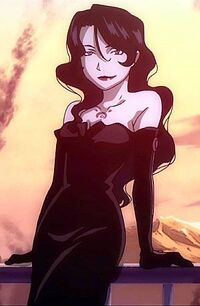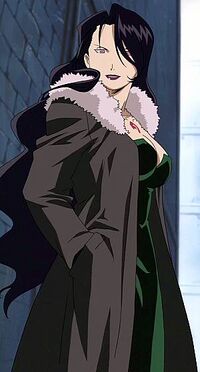Ballad for a Sex God
| Ballad for a Sex God | |
|---|---|
 The main character, Lust, shown in the opening credits | |
| Genre | |
| Voices of | |
| Country of origin | Gylias |
| Original language(s) |
|
| No. of episodes | 50 |
| Production company(s) |
|
| Release | |
| Original network | ATV Kausania |
| Original release | 5 October 2009 – 31 October 2014 |
Ballad for a Sex God is a Gylian animated series which aired on ATV Kausania in 2009–2014. Produced by Zetau Studio and the Gylian National Film Institute, it is a nénédie comedy following the adventures of Lust, a woman with a medical condition that causes every action and utterance to be permanently sexually-charged.
Plot
The series is set in contemporary Dáuzas, and follows the adventures of Lust, a woman with a mysterious past and a medical condition that causes all of her thoughts, sayings, and actions to be eroticised.
Much of the series' humour derives from the contrast between Lust's tone and her actual dialogue, with even simple requests or friendly encouragement sounding flirtatious, and the contrast between Lust's unabashed hypersexuality and the Dáuzas residents who are concerned with being respectful towards her, despite her repeated demands to be treated as an object of sexual desire.
Characters
- Lust
- Voiced by: Rena Neleş
- Lust is a woman with a medical condition that causes all her behaviours to be sexualised. Little is known about her past, and she goes only by "Lust", having that written as her name on her identity card. She has long black hair, violet eyes, and a mysterious red tattoo above her breasts. She wears a dress with long evening gloves, either black or green in colour.
- She is extremely self-confident, boastful, and loves being the centre of attention. She revels in being a sex symbol, to the point that she humorously expects to be wolf-whistled or cat-called in public as a reflection of her irresistible attractiveness, and frequently tries to reassure others that she specifically enjoys it and doesn't consider it insulting.
- A passionate woman with insatiable sexual appetites, she spends much of her time doing jobs and learning skills that help her in her efforts to preserve her attractiveness. As a result of her extensive experience, she is an accepting and friendly woman who does her best to help others. She is frequently shown encouraging others to have greater confidence and see the beauty in themselves, and jokingly reminding them "Are you trying to argue with Lust?" if they are still discouraged.
Production
Ballad for a Sex God originated as a collective Zetau Studio project. Once Lust's character design was created, the team decided the character was best suited for nénédie. Dáuzas was chosen as the setting, and the writers decided to play up the regional angle as much as Lust's sexuality, filling the show with jokes, references, and regional products that represented Kausania and would appeal to Kausanians.
The title of the show came from a Bill Drummond song, from the album The Man. One of the writers stated they slightly debated whether to feminise the title, but then concluded, "Lust is above such silly pettiness. If they'd heard us discussing it she'd just laugh." The contrast between Lust and the residents mirrored the creative team's own concerns that the jokes about Lust demanding to be wolf-whistled or being proud to be called a "slut" could be misinterpreted.
The series was produced by Zetau Studio and the Gylian National Film Institute between 2009 and 2014. Given its strongly regional setting, it was naturally aired on ATV Kausania. The official model sheet for the animators instructed, "Lust is to be drawn at all times smiling, warmly or smugly depending on the scene."
Rena Neleş was cast as Lust, an "obvious choice" given her breakthrough that year in the similar role of Liza Runecastle from Castle Bang. She said that some of her initial line readings for Lust were more mischievous, but were revised at the voice director's request, who argued that Lust was funnier the more dignified and noble she sounded. Rena later credited the series with teaching her that "sometimes, you have to sacrifice big laughs to stay true to the character, and consistently getting smaller laughs strengthens the show."
Ballad for a Sex God is driven by the literary device of "enlightenment through excess", as established by Dæse Şyna. Lust is shown as unabashedly sexual in all areas of her life, a pursuit that has given her a sense of calm, inner peace, and strength. Her full awareness of who she is and what she is doing have overpowered any sense of hesitation or self-doubt. The team partly drew inspiration from Heart of the Village in giving Lust a similar role: although placed in the city rather than a village, Lust's thorough hypersexuality have given her exceptional social expertise. She intimately knows everyone in the city and has a great sensitivity to their emotions, desires, relationships, and social dynamics.
Reception
Ballad for a Sex God was a critical and commercial success upon airing. It became one of the biggest hits of the nénédie genre, with reviewers praising the strong characterisation, comedy, and voice acting.
Radix praised the show for its "thoughtful and playful exploration of what it means to be a sex symbol", highlighting the way Lust was portrayed as kind, helpful, and a social expert as a result of her overpowering sexuality.
The series was uploaded to Proton TV as it aired, and was later released on DVD.
